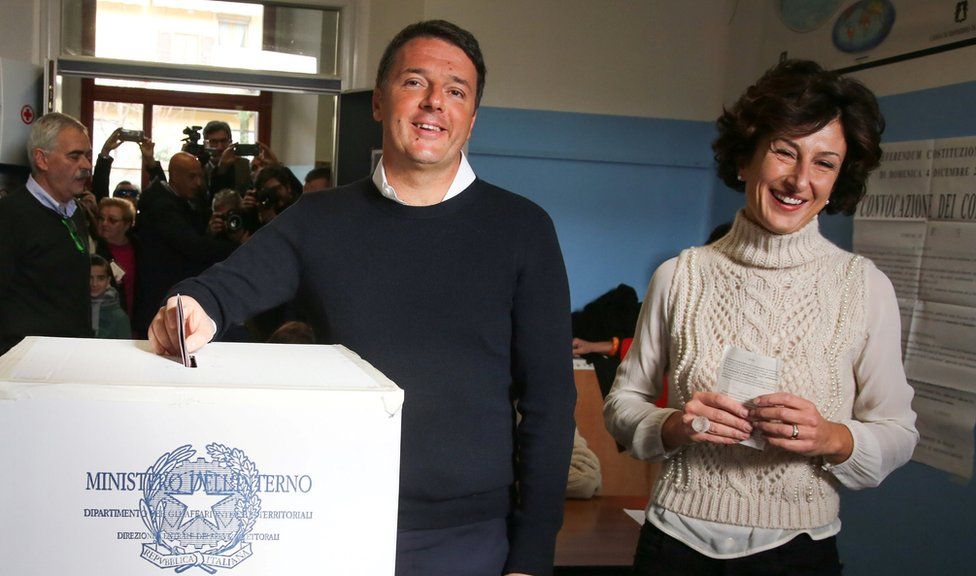Italy referendum: PM Renzi's future in the balance
- Published

The polls have closed in Italy, in a referendum which is being closely watched for further signs of anti-establishment sentiment in Europe.
The vote, called by centre-left Prime Minister Matteo Renzi, is formally on plans to streamline parliament but is expected to be used as a chance to register discontent.
Populist parties support a No vote.
The turnout has been very high by Italian standards - about 60% on average.
Nearly two-thirds of the electorate has voted in prosperous northern Italy but the turnout was much lower in the south.
Voting began on Sunday at 07:00 (06:00 GMT) and ended at 23:00 local time.
Matteo Renzi, who has said he will resign if he loses, is set to address the Italian people at midnight (23:00 GMT).
What's being decided?
James Reynolds: "Many voters have yet to make up their mind"
In brief, the reforms include reducing the power of the Senate. Its members would be cut from 315 to 100, with most drawn from mayors and regional representatives.
Mr Renzi says the reforms would speed up the cumbersome law-making process in Italy, which has had 60 governments since 1948.
Opponents say the proposals would concentrate too much power in the prime minister's hands.
Some 50 million Italians have the right to vote in the referendum - many voters are fed up with years of economic stagnation.
Italy's referendum: The scooter rider's guide
An opinion poll in November gave the No vote a lead of at least five percentage points. But many Italians are thought to be still undecided.
(The full details of what is at stake in the referndum are further down in this article.)
What would a No vote mean?
The No campaign in Italy has been spearheaded by the the anti-establishment Five Star Movement, led by Beppe Grillo. It wants a referendum on whether Italy should keep the euro.
Populists, including the Five Star Movement and the anti-immigrant Northern League, would receive a boost from the prime minister's defeat.
If Italy votes No, it would follow a similar trend seen with the UK's vote in June to leave the European Union, as well as the rise of the anti-immigrant Front National in France and populist parties elsewhere (along with Donald Trump's unexpected win in the US presidential election).
But the possibility of Mr Renzi, 41, falling from power has reignited concerns about financial stability in the eurozone's third largest economy.
If Mr Renzi does lose, it is still not entirely certain that he will be out of power.
President Sergio Mattarella could ask him to form a new government or appoint a technocratic prime minister to serve until elections due in 2018.
What Renzi wants to do:
- Reduce the power of the second chamber of parliament, the Senate, which is currently equal to the Chamber of Deputies
- Cut the number of Senators from 315 to 100 and strip the Senate of the right to hold votes of no confidence in the government
- End elections to Senate and fill it with 21 regional mayors, 74 regional council heads and five other members selected by the president
- Reformists say this would cut the cost of politics by €500m (£430m; $530m) a year and speed up lawmaking by ending decades of parliamentary ping pong
Mr Renzi told the BBC in September why the vote would cut the cost of politics
Referendum text:
Do you approve the text of the Constitutional Law on 'Provisions for exceeding the equal bicameralism, reducing the number of MPs, the containment of operating costs of the institutions, the suppression of the CNEL and the revision of Title V of Part II of the Constitution' approved by Parliament and published in the Official Gazette n° 88 of 15 April 2016?
Are you voting in the Italian referendum? What are your thoughts on the poll? You can email haveyoursay@bbc.co.uk with your comments.
Please include a contact number if you are willing to speak to a BBC journalist. You can also contact us in the following ways:
- Whatsapp: +44 7525 900971
- Send pictures/video to yourpics@bbc.co.uk
- Upload your pictures/video here
- Tweet: @BBC_HaveYourSay
- Send an SMS or MMS to 61124 or +44 7624 800 100
- Published1 December 2016
- Published5 December 2016
- Published1 December 2016
- Published4 December 2016